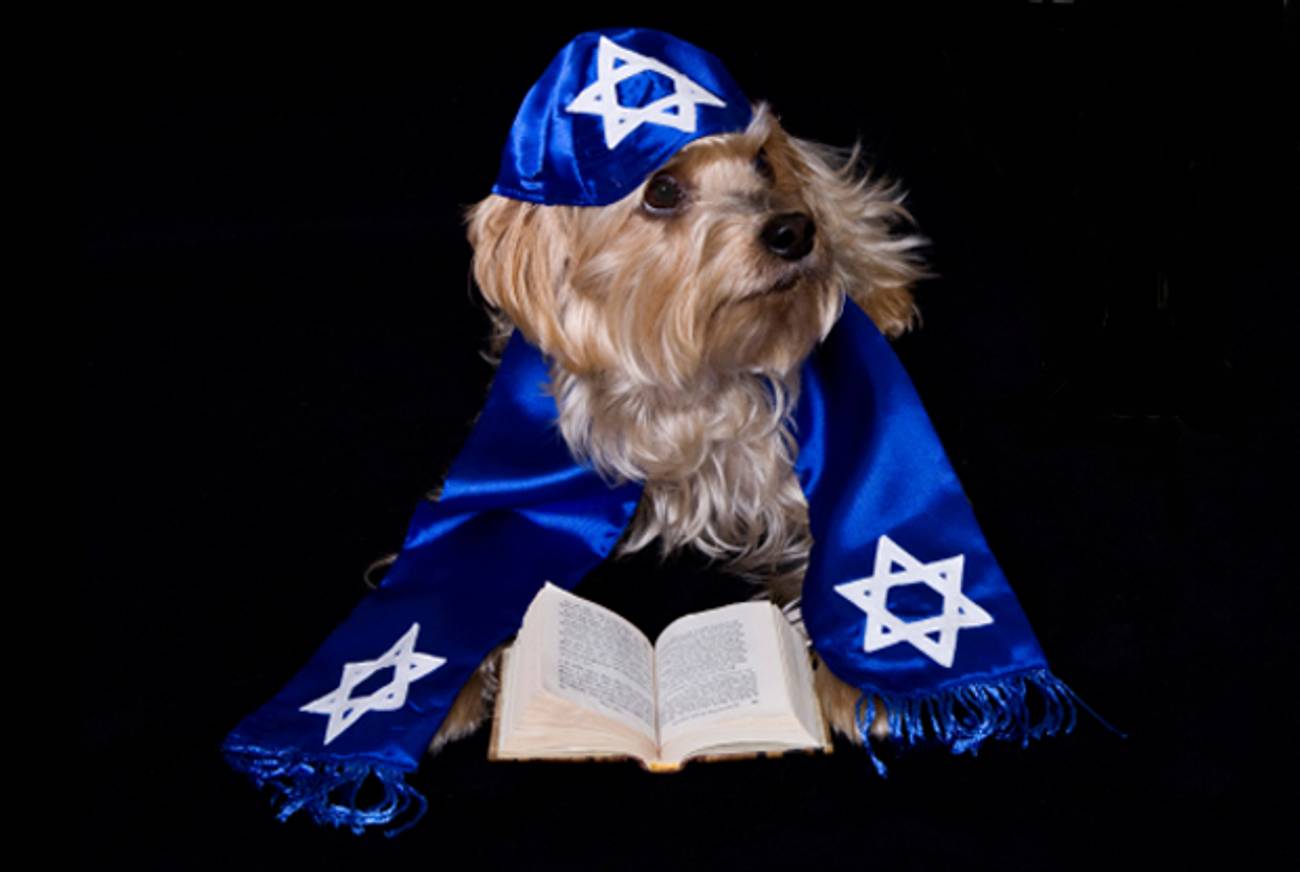The Rabbi Who Blesses Jewish Pets
‘I figured if it was good enough for St. Francis it was good enough for us’




On a Sunday in late September, 13 dogs and one goldfish—and their owners—gathered in Rabbi Eddie Sukol’s Cleveland, OH backyard for the 11th annual blessing of creation ceremony.
“If the rabbi was giving out free blessings, we were going to take them,” laughed Heidi Solomon, who came to the service with her easily excitable rescue dog, Moose. “We will take any blessings we can get.”
The tradition of blessing pets is not exactly a Jewish one, Sukol, a Reform rabbi, acknowledged. It is, however, a centuries-old Catholic tradition attributed to St. Francis of Assisi, known as the patron saint of animals. Each year in the fall, Blessing of the Animals ceremonies take place at Franciscan churches across the country.
“I figured if it was good enough for St. Francis it was good enough for us,” Sukol told the 40 participants and yarmulke-clad dogs with a laugh, “so I stole it from them.”
It’s a nice story, though it’s not entirely true. Around 12 years ago, Sukol was teaching Hebrew school to elementary school students. His goal was to get them to connect Jewish life with daily life. And one of the things his classes most wanted to talk about was their pets. So Sukol decided to put together a service with a few makeshift blessings his students and their parents could say to their pets. He ended the service with a folk song called “All God’s Critters Have a Place in the Choir.”
The attendees loved the service, and Sukol realized it could work as an annual event. In 2001, he offered the second annual blessing ceremony to his entire congregation, holding it, rather appropriately, on a Sunday between Torah readings of the creation story and the story of Noah.
It was a huge hit—and Sukol got to know more of his congregants, including people like Cindy and Larry Mittman. They got married when they were 50, and since they were too old to have children, they adopted a dog they named Shimon, Hebrew for Simon, one their one-year anniversary.
Shimon, in many ways is their child—which they admit can occasionally make them feel left out of the community. The service brings them together with other people whose animals also mean a lot to them. Indeed, the annual service often turns into a therapy session of sorts for people who feel their pets have “rescued them.”
“At these services I get to see another side of [my congregants] that I don’t normally see,” Sukol, who himself has a dog—and a flock of chickens—told me. “And often people use this occasion as an opportunity to come up to me and talk about something serious in their lives.”
The service is also ripe for all kinds of jokes and puns. The Mittmans joke that their dog is dyslexic and as a result, “He thinks he’s God, not a dog.” The Krohngolds joke that their dog Lucy is high maintenance, like some other women they know.
“She hates fatty meats and eats mostly grilled skinless boneless chicken, mixed with cheese,” says Bonnie Krohngold (making her a very “unkosher dog too,” her husband Wally adds). This year’s service had in attendance a dog nicknamed Mazel and one named Tov, who kept getting confused every time the words “mazel tov” were said (which was often).
When Sukol first started this service twelve years ago, he knew of no other rabbis doing anything similar. But since he’s started, he’s noticed the trend has taken off in cities in Florida, Michigan, New York, and California by rabbis who are looking for new ways to connect with their congregants.
Some Jewish leaders disapprove of this type of Christian-based service. “As Orthodox rabbis we work within the traditions of Jewish liturgy and experience,” Rabbi Mark Dratch, executive vice president of the Rabbinical Council of America, explained. “We believe it’s not our right or prerogative to create new ceremonies like this … even if pets are an important part of the family.”
But other rabbis think the blessing ceremony is a great outreach opportunity for their congregants. “We say blessings over all kinds of things: rainbows, unusual sights and sounds … so why would we not say a blessing over family members who happen to be pets?” asked Rabbi Arnie Sleutelberg of the reform Congregaton Shir Tikvah in Troy, Michigan. “Our world is not full enough of blessing. Any chance we can to add to the list of blessings we should.”
And as for the detractors, Sukol shakes them off. “It’s true this was originally a Christian thing that we’ve emulated, but imitation is the most sincere form of flattery,” he laughed. “This is not Kol Nidre. Not everything has to be so serious.”
Then he went inside to celebrate with dinner: a generous spread of pizza, salad, and dog and fish treats—with no animal crackers in sight. “We thought it would be rude to the pets to have them,” Sukol explained.
Rebecca Meiser is a freelance writer living in Cleveland.